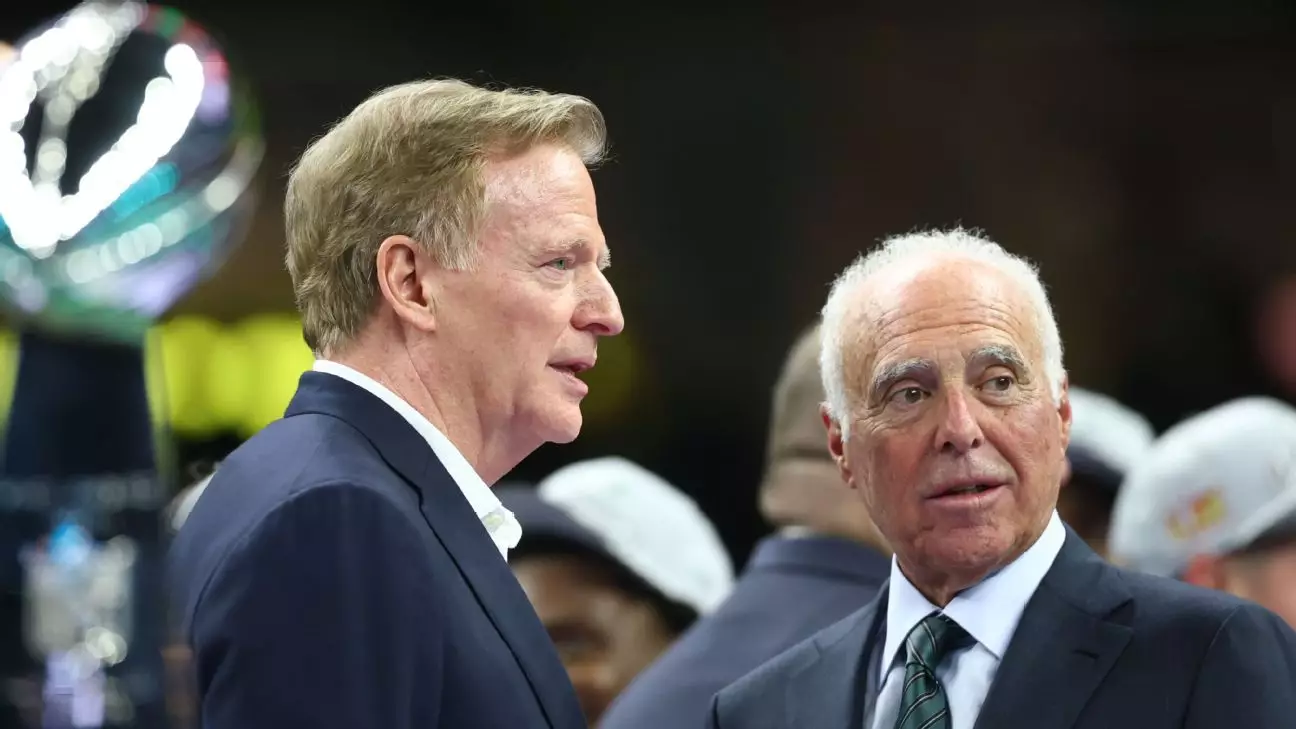The aftermath of Wednesday’s NFL owners’ meeting in Eagan, Minnesota, has reverberated far beyond the conference room, encapsulating the tensions that flutter beneath the surface of sports governance. At the heart of the discourse was a single play—the so-called “tush push,” a short-yardage maneuver that has garnered both affection and disdain. What should have been a routine gathering morphed into a battleground for competing ideologies within the NFL. Ultimately, the clash is not merely over a play; it represents a larger philosophical struggle within a league deeply entrenched in tradition and yet yearning for evolution.
Eagles owner Jeffrey Lurie took the spotlight as he stood up for his prized tactic, exhibiting a fervor that typified a man not only concerned about the future of his team but also about the very essence of competition. His impassioned plea was not simply about keeping a controversial play in the playbook; it was a defense of innovation against the goliaths of conventionalism. Interestingly, Lurie employed an analogy that, while crass, resonated with an authenticity that indicated how deeply he believes in what the Eagles are accomplishing. By likening the thrill of deploying the play to a “wet dream,” he surely irked the sensibilities of some attendees but undeniably illustrated the passion that drives players and owners alike.
The Fragile Nature of Progress
The dynamics surrounding the tush push reveal a perilous reality facing the NFL: the delicate balance between tradition and progress. On one hand, you have proponents of the nostalgic game that has always been more about ingenuity than brute force. On the other, there are the purists who fear any deviation from established norms. The argument that banning the tush push would enhance quarterback safety, enthusiastically supported by NFL commissioner Roger Goodell, seems flawed when juxtaposed against valid points raised by Lurie. By advocating for the removal of a successful play, executives risk alienating not just teams but also fans who crave excitement in an evolving game.
One cannot help but wonder if the insistence on banning the tush push stems from a desire to maintain control rather than prioritize player safety. Is it not telling that a play which has emerged from tactical innovation is being attacked not on its own merits but through the lens of risk management? The NFL, which historically has grappled with issues of player safety, now finds itself in the uncomfortable position of suppressing originality in the pursuit of perceived stability.
The Underlying Politics of Sports
The tension-filled hour witnessed during the session was not just about football; it spotlighted the deeper undercurrents of political maneuvering that saturate sports. The reactions to Lurie’s comments, particularly the swift rebuke from executive Troy Vincent, underscore how carefully owners must navigate the complex web of public perception, gender considerations, and legacy. Lurie’s candor, while refreshing, seemed reckless in such a politicized environment, laying bare the fine line between authenticity and professionalism.
Ultimately, this debate is illustrative of broader, systemic issues facing many institutions today. The friction between safeguarding tradition and embracing new strategies serves as a metaphor for contemporary societal struggles. In seeking to encapsulate the spirit of the game, one wonders whether the NFL is more focused on preserving its long-standing image than on fostering genuinely entertaining football.
Implications for the Future
As the vote to ban the tush push failed, falling two votes shy of the necessary threshold, it raises critical questions: What does this outcome mean for the future of the NFL? Will this decision encourage teams to innovate further, or will it lead to a pushback against creativity in the face of pressures from traditionalists? More importantly, the survival of the tush push may become emblematic of a larger movement towards a more modern interpretation of the game, one that embraces the unpredictable and the audacious.
In the end, the tussle over the tush push could define a turning point in the NFL. If the league refines its focus on innovation, perhaps it will not only save a play but also reinvigorate its steadfast fanbase. However, if it chooses to cling to outdated notions of what professional football should look like, it risks hardening the very traditions it once sought to elevate. Just like the game itself, the path forward is fraught with tension, possibility, and the thrilling promise of change.

Leave a Reply